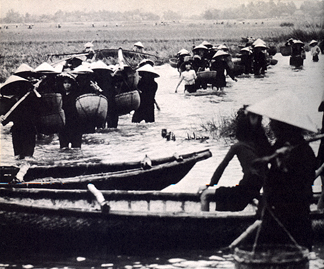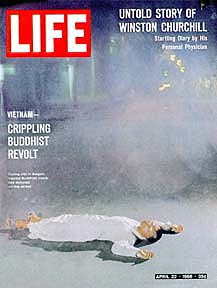|
Back
East Or West Indies
|
"THIEN, THE VIETNAMESE ZEN
THE HISTORY of Vietnamese Buddhism spreads over the eighteen
centuries since Buddhism was introduced into Vietnam through
two ways: by sea from India and by road from China. At first,
Buddhism came into the country along with the Chinese and Indian
merchants. However, Buddhist works dating from the the thirteenth
and fourteenth centuries recorded the presence of foreign monks
in Giao Chau (present-day North Vietnam) from as early as the
second century A.D. Giao Chau was then the rest station for Buddhist
missionaries traveling by sea between India and China and vica
versa.
From the second century A.D. to the tenth century two popular sects among
the population of Giao Chau were the A-Ham (Agama) and the Thien
(Dhyana). Gradually the Thien sect became dominant and later
gave rise to other native sects and subsects.
In the history of Vietnamese Buddhism, Thien (in Sanskrit, Dhyana;
Chinese, Ch'an; and Japanese, Zen) is by far the most important
sect. The practice of Thien is by no means easy. It requires
a profound and powerful inner life, long and persistent training,
and a strong, firm will.
The attitude of Thien toward the search for truth and its view
of the problem of livivg in this world are extremely liberal.
Thien does not recognize any dogma or belief that would hold
back man's progress in acquiring knowledge or in his daily life.
Thien differs from orthodox religions in that it is not conditioned
by any set of beliefs. In other words, Thien is an attitude or
a method for arriving at knowledge and action. For Thien the
techniques of right eating and drinking, of right breathing and
right concentration and meditation, are far more vital than mere
beliefs. A person who practices Zen meditation does not have
to rely on beliefs in hell, nirvana, rebirth, or causality; he
has only to rely on the reality of his body, his psychology,
biology, and his own past experiences or the instructions of
Zen Masters who have preceded him. His aim is to attain,
to penetrate, to see; once he has attained satori
(insight) his action will conform by itself to reality."
~Thich Nhat Hanh, Vietnam: Lotus In A Sea Of Fire,
pub.1967, (pgs.4 & 5.)
 "'One night while we were
working, Dennis came to the house, complaining that the Beach
Boys' stage outfits, the candy-striped shirts and straight-legged
slacks that my dad had picked out in the band's infancy, had
elicited ridicule in some of London's hipper circles. I sympathized,
while Van Dyke immediately interpreted Dennis's tale on a much
broader level. He saw it as a small example of the shame the
U.S. was suffering throughout the world as a result of the Vietnam
War.
"'One night while we were
working, Dennis came to the house, complaining that the Beach
Boys' stage outfits, the candy-striped shirts and straight-legged
slacks that my dad had picked out in the band's infancy, had
elicited ridicule in some of London's hipper circles. I sympathized,
while Van Dyke immediately interpreted Dennis's tale on a much
broader level. He saw it as a small example of the shame the
U.S. was suffering throughout the world as a result of the Vietnam
War.
"We should hit it head-on," he said.
"I like it," I said. "I don't know much about
it, but my instincts tell me you're right.'"
~Brian Wilson, Wouldn't It Be Nice, (pg.162.)

|

